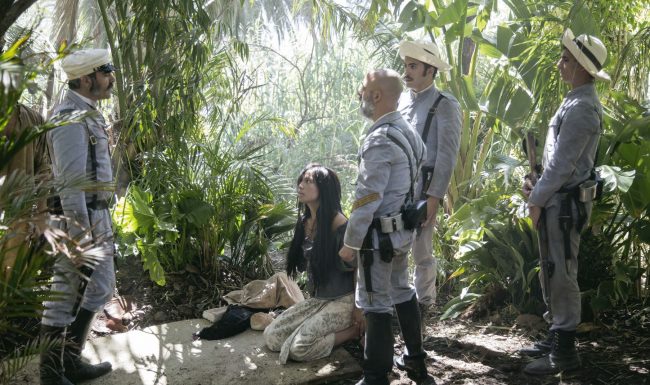Part of the Edinburgh Spanish Film Festival
This epic war film based on true events follows an inexperienced Spanish Army unit led by Lieutenant Martin Cerezo (Luis Tosar), under the orders of Captain Enrique de las Morenas (Eduard Fernandez) who are sent out to the remote Philippine jungle village of Baler to try and reclaim the territory for Spain following a massacre of Spanish troops there by the indigenous Tagalog forces. One of the soldiers, aspiring artist Carlos (Alvaro Cervantes), tries to keep his sanity amidst the chaos by befriending opium-addicted missionary Brother Carmelo (Karra Elejalde). However, even Carlos succumbs to the shared madness that infects the men as they are forced back into a ruined church in Baler, where they spend a year trying to maintain their position and what little is left of the Spanish Empire with it.
Director Calvo and cinematographer Alex Catalan provide visually captivating imagery that adds to the hellish nature of the situation faced by Cerezo and his men. Battle sequences between the soldiers and their Tagalog counterparts are intense and cluttered, reflecting the chaotic nature of the conflict. One later skirmish makes substantial use of blood spattering onto the camera lens – a technique normally seen in lurid horror films such as Frankenstein’s Army – which, in the context of this film, further underlines the horrors of war as well as the increasing meaninglessness of fighting to maintain Spanish imperialism.
However, it is in the depiction of the conditions endured by the soldiers inside the church at which Calvo most excels. The audience is not spared the details of the effects of illness and isolation amongst the men, particularly regarding an outbreak of beriberi, where graphic images of swollen feet and skeletal bodies are used to show the ravaging effects of the disease on the soldiers’ bodies.
The oppressive tone of the film is assisted by the engaging and convincing performances from the main cast. Tosar provides Cerezo with a steadfast unwavering dedication to defending the honour of Spain that he continues to maintain even when informed that his struggle is meaningless. In contrast, Cervantes captures the initial idealism of Carlos, whose only priority at first is to receive a recommendation allowing him to enter art school, as well as his eventual descent into opium-induced psychosis.
1898, Our Last Men in the Philippines is a visceral, emotional and informative depiction of a crucial event in Spanish history that serves as an effective representation of the folly of war.
